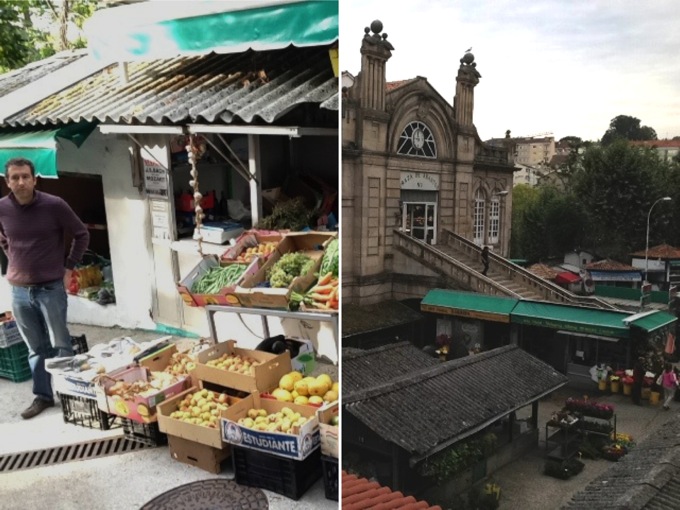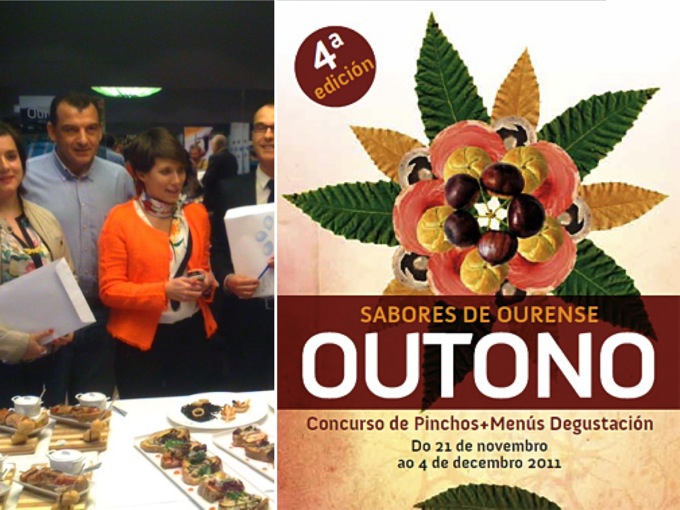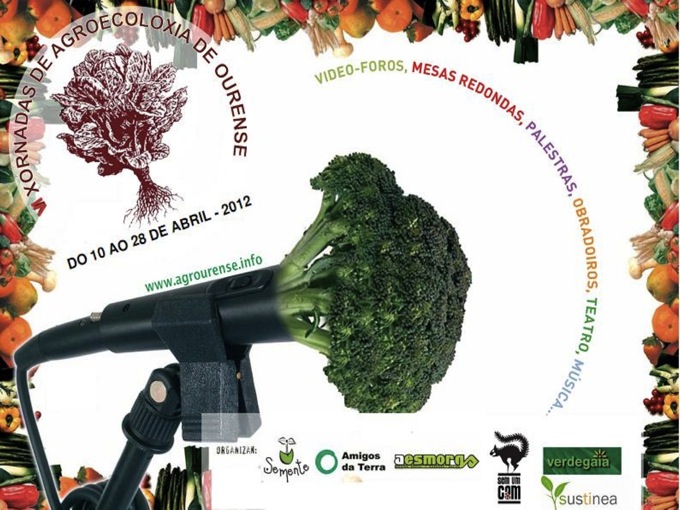Ourense / food and sustainability
The food project in Ourense started in January 2011. Traditionally, the city use to have a strong culture in growing food with a majority of farmers. After war with the raise of tertiary, working population has turned to be townsmen and agriculture activity has progressively decreased. Nevertheless, land is still there and hopefully has kept all its quality thank to non-polluted activities in the territory.
Ourense total amount of local businesses food processing industries (including beverages) means 1,1%, distribution business make 3,2% and restaurant/food-industry activity means 9%. Working population charged with food production (agriculture, stock breeding) mean less than 1% of total active population.
Growing
The major issues of “growing” topic are, on the one hand, dealing with the big uncontrollable fires on abandoned lands, and on the other hand promoting a dynamic local food supply that could create new kind of employment opportunities and maintain a strong local food culture.
9% of Ourense territories is legally reserved for agricultural uses but there is not big farming facilities location. Indeed, pieces of land are disseminated in the city. Common growing places are private household small gardens and allotments with an average surface 1,5 ha and mainly located in Ourense peri-urban fringe: Seixalbo, Santa Cruz de Arrabaldo, Beiro, Castro de Beiro, Ceboliño, Cudeiro, Santa Mariña do Monte, Montealegre, Palmés, Rairo, Reza, Trasalba, Untes, Velle, Vilar de Astrés, Vista Fermosa, Canedo.
2000 m² of urban public garden are allotments cultivated by Ourense neighbours. Many other actors are involved in growing food as farmers, cooperative farming workers and household farmers.
| Recovering traditional style and food production in Seixalbo | Since 2009 the city council is supporting a patrimonial rehabilitation of houses in Seixalbo, a 780 inhabitant’s village in Est Ourense peri urban area. This place is well known for its dynamic social life also connected with traditional food culture. Most of the dweller families own allotments. The idea of recreate a local air market on one of the village squares may be an occasion of linking local hobby farmers and professional producers with consumers coming from the city centre.One of the main issues of promoting local food is to renew the images of agriculture that is currently seen as laborious and hard job. At University of Vigo, the existence of curriculums in food sector is a way to attract new kind of producers and maybe change the people perception on agricultural matters.
| University of Vigo Science Faculty Research Groups | Currently, University is building on cross-fertilization between 3 curriculums of Food Science & Technology, Agricultural Engineering and Environmental Science. The 300 students are likely to take active part in the Ourense food project by working on local food system and be vector of sensitization.Another action is to enable inhabitants to grow food in their territory. An early education training in public allotments may have an effect of reconnecting people with the pleasure to cultivate and reap self-production.
| Urban vegetable plots for citizens | City Council has developed a pilot project on urban vegetable gardens: an area of 2.000m² where citizens are welcome to farm their own horticulture products. A little portion of these allotments are reserved to primary schools, where kids develop several educational projects.Delivering
Most of the food delivering is made with transport by road. Even if there is no figures about it, a larger part of the population buy his food in the numerous supermarkets and the two malls of the city. Local food supply chain is not currently effective. Nevertheless, there is a potential for development with the 2 traditional markets in historic centre and in Ponte areas with its 110 retailers that procure 210 jobs. Those are planned to be completely restructured and modernized. Even if the majority of sellers and consumers are more than 50 years old, it seems that a renew kind of young people come to get their food in week end time.
Moreover, two food purchase groups are actively connecting farmers and consumers. Semente CO-OPS is composed by more than 30 people on a buying commitment with around 8 producers from neighbor rural areas. “CO-Ops Auriense”, got a buying commitment with an established ecological cooperative with 5 associated producers and 6 collaborators joining their purchases in order to decrease transportation costs.
Some small retailers are still selling food in the city centre. With the development of a local food procurement, the “delivering” could become a way to recreate jobs around food.
| Ourense and Canedo Central Market refurbishment | The city council is focused on the rehabilitation of the two traditional markets in order to make integrated projects and promote local vegetables and food production. The new markets will include facilities as complementary supermarket, parking and new bases for developing social life as bars, restaurants, meeting points. Currently, consumers can have free public transport access if coming to shop at the local markets.Enjoying
Ourense, as part of Galician culture, holds an important tradition related to food and cook. People are proud of having an “Atlantic diet”, different from what is used to associate to Spain (“Mediterranean diet”), based on quality raw ingredients (mainly fresh horticulture) and pork meat: a homemade low elaborated cooking. There are also some identity and distinctive local specialties (products and dishes) as chestnuts, octopus, as well as a well-known and highly valuable wine production.
Within this cultural context, gastronomy is a highly valuated and beloved element in the city: Ourense hold a wide range of restaurants and catering services and people commonly make use of them, most of time linked to social activities (I.e celebrations). Tourism assessments had shown gastronomy is the visitants’ second most valuable item within the city.
| Sabores de Ourense | “Sabores de Ourense” took place twice a year, two weeks in Autumn and two weeks in Spring since 4 years. Restaurants, pubs and taverns are invited to create small dishes (“tapas”) on a topic proposed, usually the use of local and seasonal raw products, to enter a sort of popularity and quality contest. Several prize categories are awarded regarding public vote, professional jury, press jury, etc… With around 6.000 votes and around 40 businesses involved, this event is quite popular among neighbours and is also a tourist attraction.The municipality has developed a special communication events program to raise awareness on the rich food local context and potentialities. The cooperation with active organisations shows a will to create a share dynamic around food topic.
| Ourense VI Agroecological Week | Since 2005, several local civic associations (ecologic NGOs, cultural associations, etc) have joined forces in order to organize one-week event on ecological and sustainable agriculture. Several issues are addressed in an extent program of activities: ecological seeds bank exchange, panels, round tables, excursions to agroecological farms.




